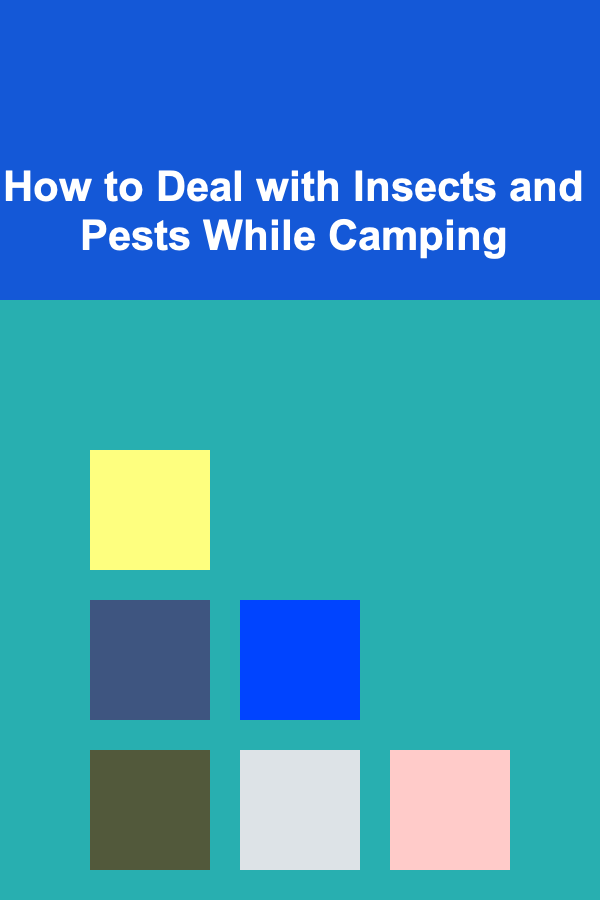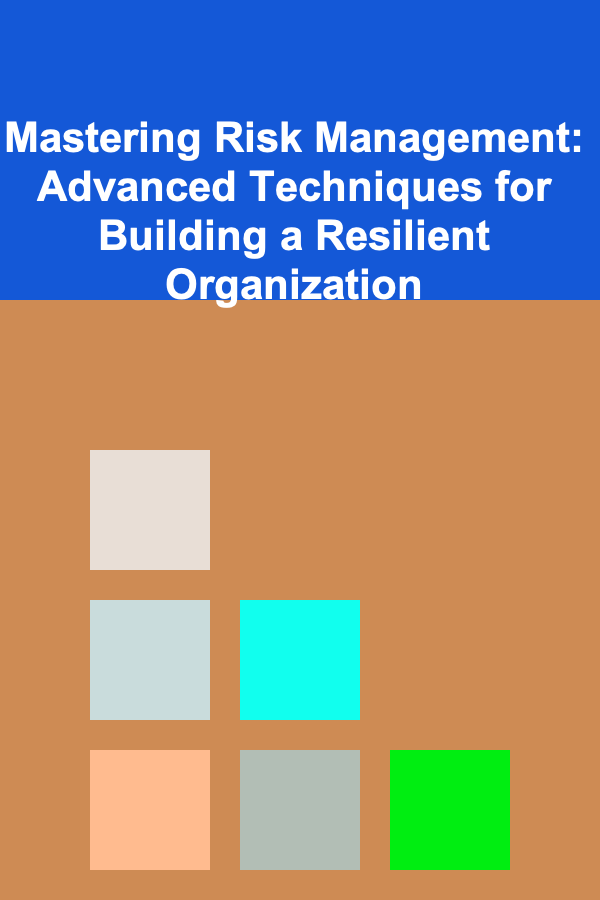
How to Deal with Insects and Pests While Camping
ebook include PDF & Audio bundle (Micro Guide)
$12.99$10.99
Limited Time Offer! Order within the next:

Camping is one of the most rewarding outdoor activities, offering a chance to disconnect from daily life, enjoy nature, and experience the great outdoors. However, one of the main challenges that campers face is dealing with insects and pests. From mosquitoes to ants, ticks to spiders, these creatures are an inevitable part of camping, and their presence can sometimes detract from the overall experience.
In this article, we will explore various strategies for preventing and managing insect and pest issues while camping. We will discuss preventive measures, effective repellents, camping gear, and techniques to create a more enjoyable, pest-free camping experience. By understanding the types of insects and pests commonly encountered in the wilderness, as well as the tools and techniques available to protect oneself, campers can focus more on enjoying their outdoor adventure.
Types of Insects and Pests Found While Camping
Before discussing how to deal with insects and pests, it's essential to understand what types of pests you may encounter while camping. Different environments attract different types of insects, so knowing what to expect can help you prepare effectively.
1. Mosquitoes
Mosquitoes are among the most notorious pests for campers. They are especially prevalent in areas near lakes, rivers, and wetlands, where standing water is present. Mosquitoes are not only annoying but can also transmit diseases like malaria, West Nile virus, and Zika virus.
2. Ticks
Ticks are small, blood-sucking arachnids that thrive in grassy, wooded, and bushy areas. They are particularly concerning due to their ability to transmit Lyme disease and other tick-borne illnesses. Ticks often attach to skin, typically in hard-to-reach areas like the scalp, behind the ears, or in the groin.
3. Ants
While ants are generally harmless, their presence can be disruptive, especially in campgrounds. Some species of ants, like fire ants, are known to be aggressive and can deliver painful stings. Ants can invade food storage areas and ruin your meals if not properly protected.
4. Bees and Wasps
Bees and wasps can become problematic, particularly if their nests are nearby. While most species of bees and wasps are not aggressive, they can become defensive if they feel their nest is threatened. The sting from a bee or wasp can be painful, and for some individuals, it may trigger an allergic reaction.
5. Spiders
Though spiders are beneficial creatures that help control insect populations, some campers may be uncomfortable with their presence. Certain species, such as black widows and brown recluses, are venomous, though they are not commonly found in campsites. Still, it's important to be cautious when interacting with or setting up tents and equipment.
6. Flies
Flies, especially horseflies and deer flies, are another common nuisance at campsites, particularly in warmer weather. They are attracted to sweat, body odor, and food and can be highly irritating. While flies are not dangerous, their constant buzzing and biting can make outdoor activities less enjoyable.
Preventive Measures for Insects and Pests
The best way to deal with insects and pests while camping is to prevent them from becoming an issue in the first place. Here are several preventive measures that can help minimize your exposure to pests during your camping trip.
1. Choose the Right Campsite
The location of your campsite plays a significant role in determining the number and type of pests you'll encounter. Avoid camping near stagnant water sources, as these areas tend to attract mosquitoes and other waterborne pests. If possible, camp in high, dry areas with minimal vegetation and exposure to ticks and other insects.
Also, try to avoid dense brush and tall grasses, as these are prime hiding spots for ticks. A campsite with good airflow is also less likely to attract mosquitoes, as they tend to prefer still air.
2. Properly Store Food
Insects like ants and flies are drawn to food sources, so it's important to store your food properly while camping. Use airtight containers for storing food and beverages, and ensure that all food scraps are cleaned up after meals. If possible, store food in a cooler and keep it off the ground to reduce the chances of attracting pests.
If you're camping in an area with large wildlife populations (like bears), it's essential to use bear-proof containers to prevent animals from accessing your food. Hanging food in a tree, at least 10 feet off the ground, is another good practice to protect it from pests and larger animals.
3. Use Natural Pest Repellents
There are various natural repellents that can help keep insects and pests at bay. Some plants, like citronella, lavender, and eucalyptus, are known for their ability to repel mosquitoes, flies, and other insects. You can plant these herbs near your campsite or use essential oils derived from these plants to create a natural barrier around your tent and campsite.
Another effective natural repellent is garlic. Some campers swear by the idea of rubbing garlic on their skin or carrying garlic-based sprays to ward off mosquitoes and ticks. While the smell might not be pleasant for humans, it can be highly effective against pests.
4. Wear Protective Clothing
One of the most straightforward ways to protect yourself from insects and pests is to wear the right clothing. Long-sleeved shirts, long pants, and socks can help shield your skin from bites, especially in areas where ticks and mosquitoes are prevalent. Light-colored clothing is also recommended, as it makes it easier to spot insects like ticks that may be attached to your clothing.
Consider wearing insect-repellent clothing, which is treated with permethrin---a chemical that repels and kills insects. Many outdoor gear companies offer clothing options with built-in insect protection.
5. Use Insect Repellent
Insect repellents are an essential part of any camper's toolkit. Look for insect repellents that contain DEET, picaridin, or oil of lemon eucalyptus. These chemicals are effective in repelling mosquitoes, ticks, and other biting insects. Apply the repellent to exposed skin, following the manufacturer's instructions for safe use.
If you're camping in an area with a high concentration of ticks, consider using a tick repellent that contains permethrin. This chemical can be applied to clothing and gear to kill and repel ticks on contact.
6. Use Mosquito Nets
A mosquito net is an excellent investment for campers who plan to sleep in tents or hammocks. These nets are designed to provide a barrier between you and the insects, allowing you to rest peacefully without the constant buzz of mosquitoes. When using a mosquito net, ensure that it is properly secured around your sleeping area to prevent insects from getting inside.
Dealing with Insects and Pests During Your Trip
While prevention is key, there will inevitably be times when you need to deal with pests during your camping trip. Here are some tips for managing insects and pests effectively in the field.
1. Handle Mosquitoes
If mosquitoes are buzzing around your campsite, it's essential to act quickly. First, use a mosquito repellent on exposed skin and any nearby surfaces. Setting up a citronella candle or using a battery-operated mosquito repeller can help reduce the number of mosquitoes in the area.
For added protection, consider using a portable fan. Mosquitoes are weak fliers, and the airflow from a fan will make it difficult for them to hover around you.
2. Remove Ticks Safely
If you discover a tick on your body, it's crucial to remove it promptly to prevent the transmission of disease. Use fine-tipped tweezers to grasp the tick as close to the skin as possible, and pull it straight out with steady pressure. Avoid twisting or jerking the tick, as this can cause parts of it to break off and remain embedded in your skin.
After removing the tick, clean the bite area thoroughly with soap and water, and apply antiseptic. If you experience any symptoms of illness, such as a rash or fever, seek medical attention as soon as possible.
3. Eliminate Ants and Other Crawling Insects
If ants invade your campsite or food storage, take action by moving the food to a different location. You can also create a barrier by sprinkling cinnamon, diatomaceous earth, or coffee grounds around the perimeter of your campsite to deter ants from entering.
If you encounter other crawling insects like spiders or beetles, gently relocate them away from your tent using a stick or piece of paper. If possible, seal any cracks or openings in your tent to prevent pests from getting inside.
4. Avoid Bee and Wasp Stings
If a bee or wasp flies near your campsite, remain calm and avoid swatting at it. Sudden movements can provoke an attack. If you are stung, remove the stinger as soon as possible by scraping it out with a flat object (like a credit card). Clean the area with soap and water, and apply an ice pack to reduce swelling.
For those with a known allergy to bee or wasp stings, always carry an epinephrine auto-injector (EpiPen) and know how to use it.
Conclusion
Dealing with insects and pests while camping may seem like an overwhelming task, but with the right knowledge, preparation, and tools, it is entirely manageable. By following the preventive measures outlined in this article and using effective repellents, you can significantly reduce your chances of dealing with annoying or harmful pests during your camping trip. Remember that the key to a great camping experience is being prepared and adapting to your environment. With these strategies in hand, you can focus on what truly matters---enjoying the beauty and tranquility of the outdoors.
Reading More From Our Other Websites
- [Organization Tip 101] The Best Materials for Garden Shed Foundations: What You Need to Know
- [Personal Care Tips 101] How to Reap the Benefits of Hand Cream After Washing Your Hands
- [Home Budget 101] How to Leverage Budgeting Apps for Couples to Simplify Your Monthly Budget Spreadsheet
- [Trail Running Tip 101] Step by Step: Using Trail Running to Reduce Stress and Enhance Mindfulness
- [Gardening 101] Creating a Beautiful Rose Garden: Tips for Beginners
- [Personal Finance Management 101] How to Optimize Your Savings with High-Yield Savings Accounts for Financial Growth
- [Home Holiday Decoration 101] How to Design a Rustic Holiday Home Decor with Christmas Stockings and Natural Elements
- [Home Security 101] How to Set Up Home Security Cameras with Local Storage for Greater Privacy
- [Organization Tip 101] DIY Guide: How to Create a Stunning Herringbone Tile Floor
- [Home Budget 101] How to Build an Emergency Fund on a Tight Budget

How To Master Gardening with Limited Mobility
Read More
How to Scale Your Bicycle Delivery Service with More Bikes and Clients
Read More
How to Store Ski and Snowboard Equipment in the Off-Season
Read More
How to Use Online Coaching Platforms to Make Money
Read More
Mastering Risk Management: Advanced Techniques for Building a Resilient Organization
Read More
How To Find TV Shows That Explore Complex Characters
Read MoreOther Products

How To Master Gardening with Limited Mobility
Read More
How to Scale Your Bicycle Delivery Service with More Bikes and Clients
Read More
How to Store Ski and Snowboard Equipment in the Off-Season
Read More
How to Use Online Coaching Platforms to Make Money
Read More
Mastering Risk Management: Advanced Techniques for Building a Resilient Organization
Read More